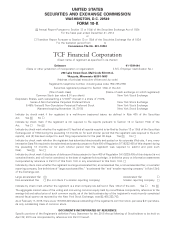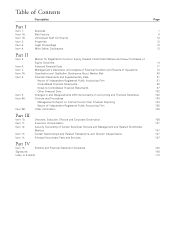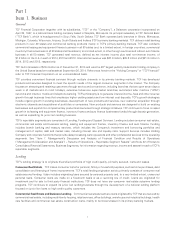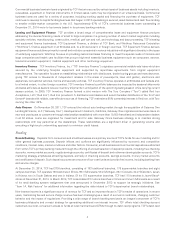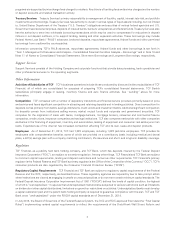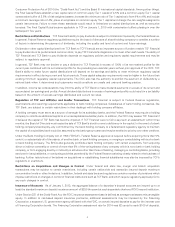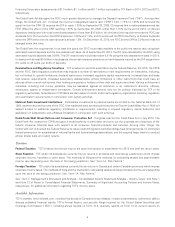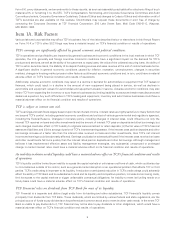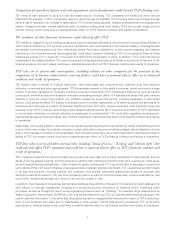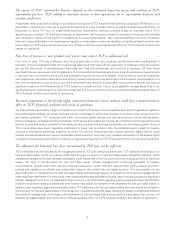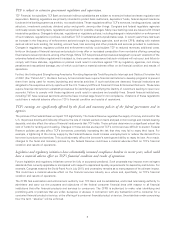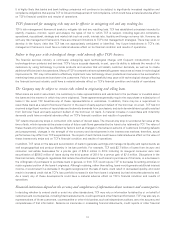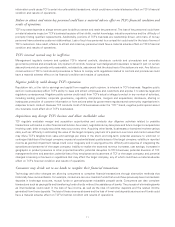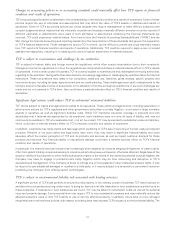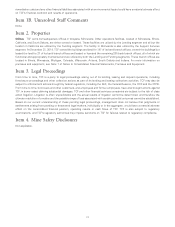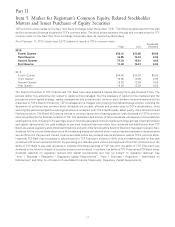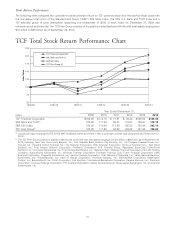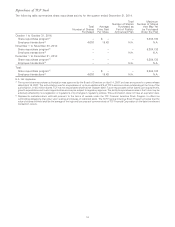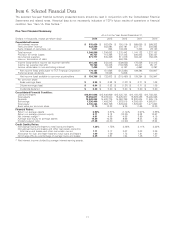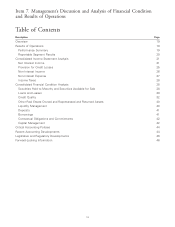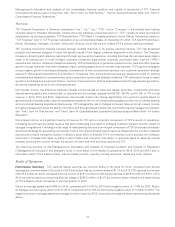TCF Bank 2014 Annual Report Download - page 22
Download and view the complete annual report
Please find page 22 of the 2014 TCF Bank annual report below. You can navigate through the pages in the report by either clicking on the pages listed below, or by using the keyword search tool below to find specific information within the annual report.TCF is subject to extensive government regulation and supervision.
TCF Financial, its subsidiary TCF Bank and certain indirect subsidiaries are subject to extensive federal and state regulation and
supervision. Banking regulations are primarily intended to protect bank customers, depositors’ funds, federal deposit insurance
funds and the banking system as a whole, not stockholders. These regulations affect TCF’s revenues, lending practices, capital
structure, investment practices, dividend policy and growth, among other things. Congress and federal regulatory agencies
continually review banking laws, regulations and policies for possible changes. Many new banking rules are issued with limited
interpretive guidance. Changes to statutes, regulations or regulatory policies, including changes in interpretation or enforcement
of such statutes, regulations or policies, could affect TCF in substantial and unpredictable ways. In recent years there has been
an increase in the frequency of enforcement actions brought by regulatory agencies, such as the CFPB, dealing with matters
such as indirect auto lending, fair lending, account fees, loan servicing and other products and services provided to customers.
Changes in regulations, regulatory policies and enforcement activity could subject TCF to reduced revenues, additional costs,
limits on the types of financial services and products it may offer or increased competition from non-banks offering competing
financial services and products, among other things. While TCF has policies and procedures designed to prevent violations of the
extensive federal and state regulations it is subject to, there can be no assurance that such violations will not occur, and failure to
comply with these statutes, regulations or policies could result in sanctions against TCF by regulatory agencies, civil money
penalties and reputational damage, any of which could have a material adverse effect on its financial condition and results of
operations.
Further, the Uniting and Strengthening America by Providing Appropriate Tools Required to Intercept and Obstruct Terrorism Act
of 2001 (the ‘‘Patriot Act’’), the Bank Secrecy Act and similar laws require financial institutions to develop programs to prevent
them from being used for money laundering and terrorist activities. If such activities are detected, financial institutions are
obligated to file suspicious activity reports with the U.S. Treasury’s Office of Financial Crimes Enforcement Network. These rules
require financial institutions to establish procedures for identifying and verifying the identity of customers seeking to open new
accounts. Failure to comply with these regulations could result in sanctions and possibly fines. Several financial institutions,
including TCF, have received sanctions and some have incurred large fines for non-compliance. Violations of these regulations
could have a material adverse effect on TCF’s financial condition and results of operations.
TCF’s earnings are significantly affected by the fiscal and monetary policies of the federal government and its
agencies.
The policies of the Federal Reserve impact TCF significantly. The Federal Reserve regulates the supply of money and credit in the
U.S. Its policies directly and indirectly influence the rate of interest earned on loans and paid on borrowings and interest-bearing
deposits, and also affect the value of financial instruments that TCF holds. Those policies determine to a significant extent the
cost of funds for lending and investing. Changes in those policies are beyond TCF’s control and are difficult to predict. Federal
Reserve policies can also affect TCF’s borrowers, potentially increasing the risk that they may fail to repay their loans. For
example, a tightening of the money supply by the Federal Reserve could increase unemployment or reduce the demand for a
borrower’s products and services. This could adversely affect the borrower’s earnings and ability to repay its loan. As a result,
changes to the fiscal and monetary policies by the Federal Reserve could have a material adverse effect on TCF’s financial
condition and results of operations.
Legislative and regulatory initiatives have substantially increased compliance burdens in recent years, which could
have a material adverse effect on TCF’s financial condition and results of operations.
Future legislative and regulatory initiatives cannot be fully or accurately predicted. Such proposals may impose more stringent
standards than currently applicable or anticipated with respect to capital and liquidity requirements for depository institutions. For
example, Congress enacted the Dodd-Frank Act in July 2010, and uncertainty remains as to many aspects of its ultimate impact.
This could have a material adverse effect on the financial services industry as a whole and, specifically, on TCF’s financial
condition and results of operations.
The CFPB has examination and enforcement authority over TCF Bank and its subsidiaries, and broad rulemaking authority to
administer and carry out the purposes and objectives of the federal consumer financial laws with respect to all financial
institutions that offer financial products and services to consumers. The CFPB is authorized to make rules identifying and
prohibiting acts or practices that are unfair, deceptive or abusive in connection with any transaction with a consumer for a
consumer financial product or service, or the offering of a consumer financial product or service. Uncertainties remain concerning
how the term ‘‘abusive’’ will be enforced.
9


